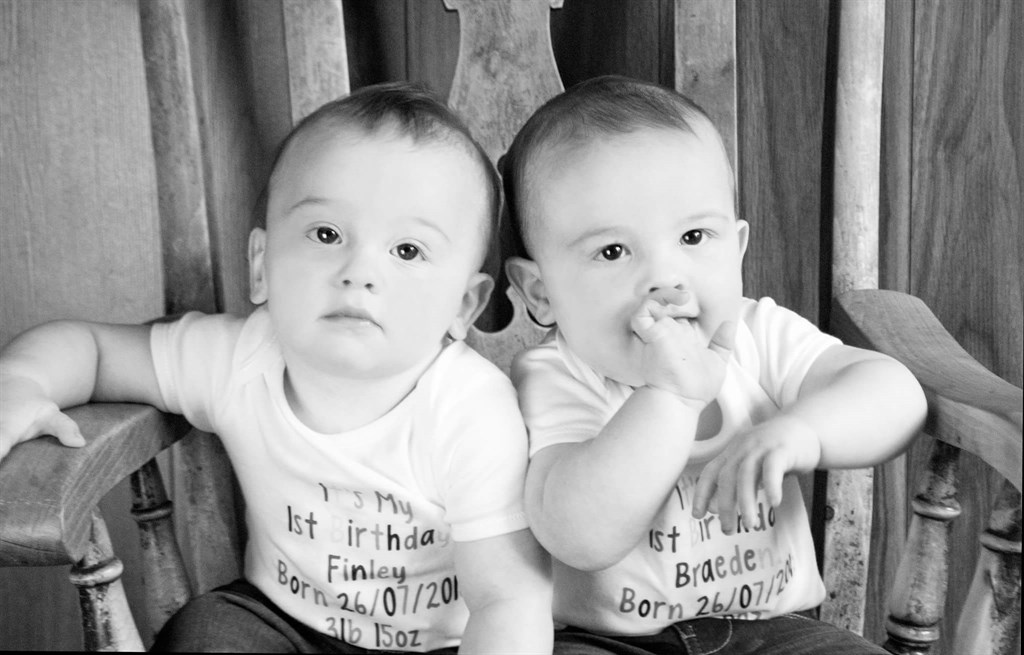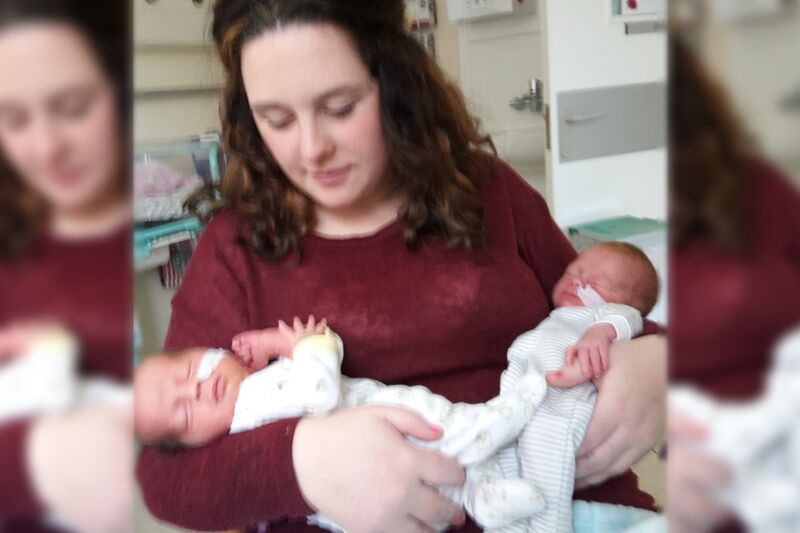My twin boys Finley and Braeden – our first children - were born at 31+4 weeks in July 2015. I hadn’t been expecting to get pregnant, let alone to have twins – it was a shock! I had bleeding early on and was sent for an emergency scan at seven weeks, which showed two babies.
My pregnancy wasn’t the best. I spent three weeks in hospital and developed a condition called Intrahepatic Cholestasis of Pregnancy (ICP). It caused my bile acids to rise and my whole body just itched like crazy.
I had my baby shower, and was then admitted to hospital, as Braeden’s heart rate had increased to over 200. It was terrifying but it came back down and I was closely monitored.
Soon after, I woke up with the most horrific back pain. No matter what I did, I couldn’t get comfortable. I went from chair to bed, sitting to lying, even bouncing on a ball. Anything to make the pain pass. By 9pm I knew something was wrong and called my partner to the hospital.
I waited for a doctor. At 2.30am I was already 3cm dilated and moved to the labour ward. Our boys were born after 11am weighing just 3lb 15oz and 4lb 6oz. They lifted them up to show me and then rushed them into incubators.
They spent four weeks in neonatal care. I didn’t get to see them for five hours, and couldn’t hold them for a further 24 hours. They were all wired up and there were tubes everywhere.
It was so daunting. I’d been told they could come early, but I hadn’t prepared for seeing them this way. They had ups and downs, Braeden struggled to breathe on his own and needed extra help - it seemed we were always taking a step backwards. Finley progressed much faster, even though he was the smallest – he was breathing unaided after 48 hours.
At one point the nurses discussed separating the twins. This was because of Finley’s progress - he needed less assistance and by moving him to another hospital, they could make room for more poorly babies. But I was really worried about how I’d manage to see both of my boys if they were separated, not least because I don’t drive.
Thankfully another baby became well enough to take Finley’s place at the other hospital, meaning they could remain together.
Nevertheless, it was still a really stressful experience. I’d already had to rely on family to get to hospital to see them every day, as the hospital doesn’t provide any accommodation for parents.
Sadly, I also wasn’t offered any emotional support whilst they were there. I found myself experiencing really bad postnatal depression (PND).
I was convinced it was my fault they’d come early. I thought about everything I’d done during my pregnancy that might have made a difference. Did I always take my vitamins? Had I drunk too many fizzy drinks? Not eaten healthily enough?
I didn’t want to talk about what the twins were going through, it felt like a massive weight on my shoulders. I was their mum and I couldn’t help them, I couldn’t make them better and that was my job.

I didn’t take the best care of myself, my concern was only for the twins. I would find myself sobbing all the time and I felt isolated and alone, even though I had family around me. It felt like I was the only person in the world going through this, and while I know that isn’t true and that we were blessed our boys got well so soon, I felt I had nobody to talk to who would understand.
I didn’t feel like a mum. The hospital had put me back on a ward with women with full term babies and I felt like my opportunity for that had been snatched away. I became increasingly upset that these mums were offered pictures of their babies. That may seem petty, but for me it felt like something only a ‘normal’ mum would get.
I already didn’t have my babies. I couldn’t get up at night to feed them or change their nappies. I didn’t feel like a real mum and even less like a good mum.
I felt almost ashamed of feeling this way, but getting help was the best thing I did. A friend pointed me towards blogger Constance Hall. Her daily Facebook posts help to keep me from struggling with PND. She’s blunt and honest and I think she makes every woman feel like a queen, especially mums.
In hindsight I could really have done with support earlier on, but at the time didn’t feel able to mention that I was struggling. After we came home, I had one outreach visit but it felt as if they were there just to check how the twins were doing, but not me, so my PND wasn’t picked up.
My boys have just turned one now, and I am in an amazing place. I now feel like a mum and I can enjoy parenting.

It can be hard to admit to a problem, and initially to even recognise that you’re struggling with PND, because I spent a lot of time in denial.
But there is no shame in suffering with PND, it is more common than you realise. Getting help allowed me to become myself again, to develop a better bond with my babies and to return to everyday life. Having a poorly or premature baby is difficult enough, so you need to look after yourself too. No mum deserves to feel badly about herself, or that she’s not good enough.
That’s why I’m joining Bliss in supporting PND Awareness Week.
- Bliss is proud to be an official supporter of the UK’s first-ever PND Awareness Week (5 to 9 September), because our research shows that at 30 per cent of neonatal units in England, and over 50 per cent of units in Wales, parents had no access to psychological support.
- Find out more about PND Awareness Week on Twitter by searching for #PNDAW16 and following @Pandas_UK.
- If you have been affected by any of the issues mentioned in this post and would like support, you can view our online support pages. If you would like to share your story with Bliss, please email [email protected].
